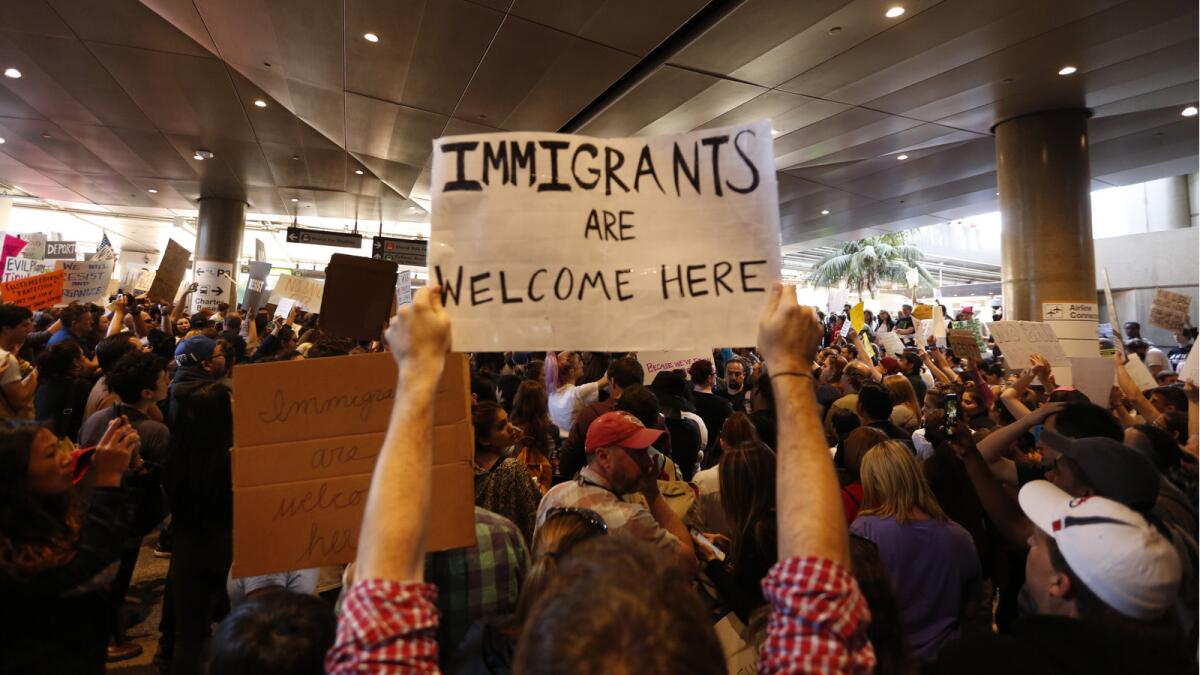Trump’s plans to vet visa applicants using social media are flawed, a watchdog says

Reporting from Washington — The Trump administration plans to vastly expand searches of the social media accounts of visa applicants to look for signs of radicalization, but pilot programs failed to measure the effectiveness of such efforts, according to a watchdog report released Friday.
Tests by the Department of Homeland Security, begun during the Obama administration, did not track whether officers successfully linked accounts to applicants or determine whether posts should be grounds for blocking admission to the United States, the agency’s inspector general found.
“These pilots, on which DHS plans to base future department-wide use of social media screening, lack criteria for measuring performance to ensure they meet their objectives,” the report said, based on a review of at least three test programs.
The first was started in December 2015, following the massacre in San Bernardino. FBI investigators found that the assailants, Syed Rizwan Farook and wife Tashfeen Malik, privately exchanged messages over social media before the Pakistan-born Malik was granted a K-1 fiancee visa to come to the United States.
In another program that began in April, applicants were asked to hand over their social media user names. Screening officials scoured those accounts to see whether “derogatory social media information” would be cause to reject requests for entry to the United States or other immigration benefits, the report said.
But the program ran afoul of Department of Homeland Security privacy regulations, and officials also found that its automated screening, using software developed by the Pentagon’s secretive Defense Advanced Research Projects Agency, did not always identify accounts that matched up with applicants.
Searching social media accounts by hand “was more effective,” the report said.
Government programs that monitor social media can end up being expensive, ineffective and create a “chilling effect” that changes the way people operate online, said Drew Mitnick, policy counsel at Access Now, a New York-based organization that advocates for privacy and digital security.
“The people who are going to be committing the most egregious acts are not going to be posting online,” Mitnick said.
Several words in the report were blacked out, apparently to protect sensitive details about the program.
The concerns are unlikely to slow down Trump administration efforts already underway to bring additional scrutiny to some travelers and immigrants, in what the president dubbed “extreme vetting.”
This week, Trump issued a new executive order temporarily blocking entry to the United States for all refugees as well as travelers from six Muslim-majority countries while new, more intrusive vetting procedures are put in place.
Homeland Security Secretary John F. Kelly told lawmakers last month that measures for “extreme vetting” of travelers were under consideration that go further than visa officers ever have.
In some cases, Kelly said, Homeland Security officials may demand that visa applicants from some countries hand over passwords to their social media accounts before flying to the United States.
“They don’t want to cooperate, they don’t come in,” Kelly told the House Homeland Security Committee.
The nations singled out for restrictions have unreliable police forces or lack identity systems to help confirm travelers are who they say they are, he said. The ban on entry applies to citizens and nationals from Iran, Libya, Somalia, Sudan, Syria and Yemen. Trump’s original executive order, issued in January, prevented immigrants from these countries, as well as Iraq, from entering the United States.
Twitter: @ByBrianBennett
ALSO:
When Trump says he wants to deport criminals, he means something starkly different than Obama
Yes, Trump can boost deportations and gut the Dreamer program for young immigrants
An outsider takes charge of the Border Patrol — and yes, he’ll wear the green uniform
UPDATES:
3:55 p.m.: This article was updated with comments from a privacy advocate.
This article was originally published at 3:35 p.m.
More to Read
Get the L.A. Times Politics newsletter
Deeply reported insights into legislation, politics and policy from Sacramento, Washington and beyond. In your inbox three times per week.
You may occasionally receive promotional content from the Los Angeles Times.









